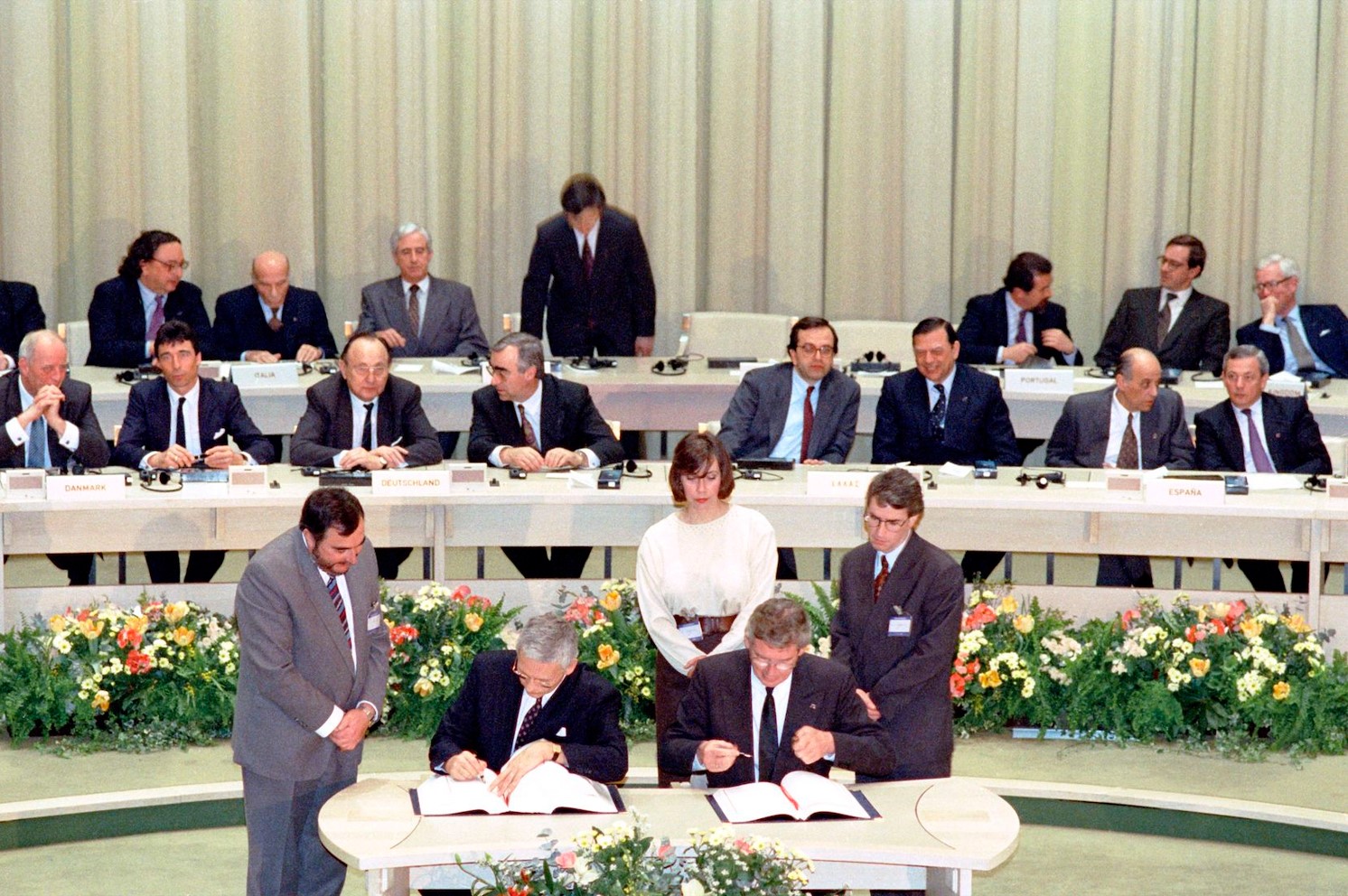The 30th Anniversary of the Maastricht Treaty
The past, present and future of European integration
Date: 28-29 September 2022
Venue: Maastricht, The Netherlands
Organisers: Prof Mathieu Segers, Prof Clemens Kool, Dr Ivan Rubinic
Institution: Maastricht University and Studio Europa Maastricht
Maastricht University and Studio Europa Maastricht are happy to invite you to an interdisciplinary academic conference commemorating a paramount milestone of European collaboration - the Maastricht Treaty.
The conference will be held 28-29 September, directly following the Euro at 20: shifting paradigms? event.
Signed by twelve countries in Maastricht on 7 February 1992, the Treaty on European Union reshaped Europe’s socioeconomic landscape on a continental scale. This seminal agreement laid the foundations for the continuation of historically unprecedented peace and was built on the idea that fostering economic and monetary cooperation would translate into welfare and shared prosperity among the citizens of Europe. In this context, the Maastricht Treaty should be regarded as a revolutionary instrument; one to end the European divide by integrating countries in order to secure stability and balance in social, economic and monetary spheres. European unification, while maintaining diversity, took place through cross-border consensus on shared values and unique market and economic freedoms.
Three decades later and 15 member states larger, present-day circumstances mandate the revision of the 1992 European social contract. Unprecedented existential uncertainties coupled with economic downturn have led to the urgent need to evaluate whether the existing institutional design still fits its purpose. The latter is most apparent in the recent example of nation-centred coronavirus pandemic solutions which were placed ahead of, currently suspended, aspirations towards European convergence. Numerous challenges must be overcome to ensure that national tensions do not overwhelm supranational prospects. From the rise of divisive populism, unequal living standards and benefits utilisation, unbalanced growth and stratification of the European social fabric; the current challenges demonstrate that activating the escape clause is not an optimal way of addressing a crisis. Therefore, the reconstruction of the European backbone based on solidarity, inclusivity and synergic cross-border collaboration is a necessary precondition for safeguarding the sustainability of this most admirable European social project.
Due to long-term disagreements being overlooked, the Maastricht Treaty currently represents an ambitious scheme that remains largely unfulfilled. This has rendered the EU unable to cope with ongoing calamities. However, regardless of its challenges, shortcomings and imperfect design, the Maastricht Treaty is an unrivalled multilateral blueprint for global governance. Hence, the reform of the Maastricht Treaty can help preserve a European way of life and chart a unique pathway of how countries can create a global sustainable framework of governance.
The conference will facilitate critical, but constructive, academic dialogue on the Maastricht Treaty’s legacy in the following areas:
- Decision-making and legal considerations
- Re-examining convergence and homogeneity
- Solidarity and identity
- Peace, security and criminology
- Social and trade affaires
- Democracy, populism and authoritarianism
- Democratisation, politicisation and citizenship
- Union of digital innovation and the digital Euro
- Wages, prices and European enterprises
- Fiscal sovereignty challenges and recent developments
Additionally, the conference is proud to host Professor Thomas Piketty and Professor Paul De Grauwe as keynote speakers.
The conference programme can be found here. Registration can be done here. For any additional information please contact the conference coordinator.
Academic Board
Mathieu Segers
Professor of Contemporary European History and European Integration
and holder of the EuropaChair of Maastricht University
Clemens Kool
Professor of Macroeconomics and International Monetary Economics,
Maastricht University
Conference Coordinator
Ivan Rubinic
Postdoctoral Researcher at Studio Europa Maastricht, Maastricht University
Email: i.rubinic@maastrichtuniversity.nl
On Tuesday 27 September, we will be organising an affiliated symposium on the occasion of the twentieth birthday of the Euro, with speakers such as Benedicta Marzinotto, Rolf Strauch and Klaas Knot. If you would be interested in attending the symposium as well, we invite you to register yourself via this link.
Academic conference on 30 years Maastricht Treaty: past, present, future
 Registration website for Academic conference on 30 years Maastricht Treaty: past, present, future
Registration website for Academic conference on 30 years Maastricht Treaty: past, present, futureStudio Europa Maastrichtinfo@maastrichteurope.nl
Studio Europa Maastrichtinfo@maastrichteurope.nlhttps://www.aanmelder.nl/academicconference30yearsmaastrichttreaty
2022-09-28
2022-09-29
OfflineEventAttendanceMode
EventScheduled
Academic conference on 30 years Maastricht Treaty: past, present, futureAcademic conference on 30 years Maastricht Treaty: past, present, future0.00EUROnlineOnly2019-01-01T00:00:00Z
European Institute of Public Administration (EIPA)European Institute of Public Administration (EIPA)Onze Lieve Vrouweplein 22 6211HE Maastricht Netherlands

